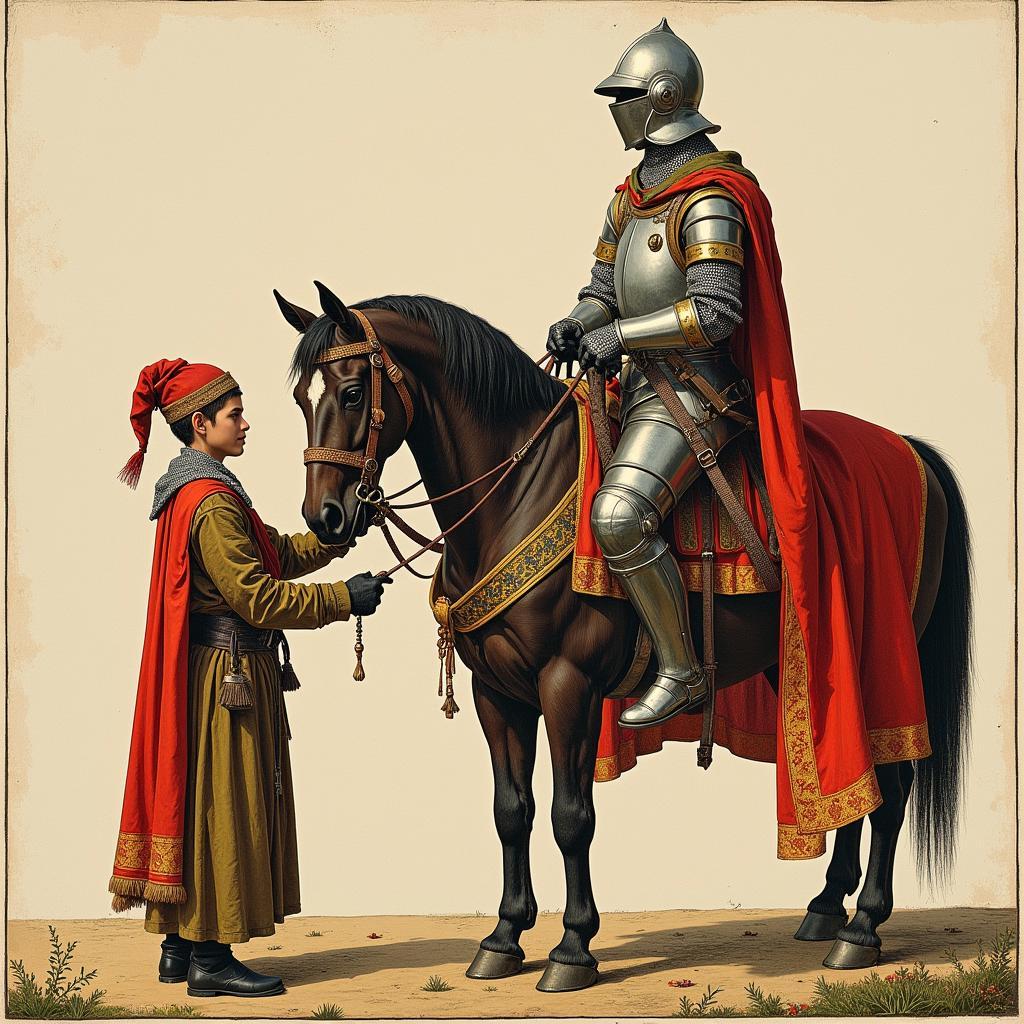Squire Vs Esquire. These two titles, often encountered in historical and legal contexts, often cause confusion. This article will delve into the origins, meanings, and modern usage of “squire” and “esquire,” exploring their similarities, differences, and evolution through time.
The Historical Roots of Squire and Esquire
Both “squire” and “esquire” have their origins in medieval European social structures. Originally, a “squire” (from the Old French esquier) was a knight’s attendant, a young nobleman learning the arts of chivalry and warfare. He would serve the knight, care for his armor and horses, and eventually be knighted himself. “Esquire” (from the Latin scutarius, meaning “shield bearer”) had similar origins, denoting a knight’s shield-bearer or attendant. Over time, both titles evolved beyond their purely military associations.
 Hình ảnh về squire và esquire thời trung cổ
Hình ảnh về squire và esquire thời trung cổ
Squire: From Knight’s Attendant to Country Gentleman
The term “squire” gradually broadened to refer to a country gentleman, particularly a landowner of some standing in rural communities. This shift in meaning reflects the evolving social landscape, where land ownership became a key marker of social status. The squire was often seen as the leading figure in his local area, responsible for administering justice, managing his estate, and participating in local government. While still associated with a sense of gentility, the title lost its strict connection to military service.
Esquire: A Title of Courtesy and Legal Significance
“Esquire,” on the other hand, retained a more formal and legal connotation. It became a title of courtesy used for various professionals, including lawyers, judges, and justices of the peace. In legal documents and correspondence, “Esq.” is often abbreviated after a person’s surname to denote their professional standing. This usage persists in some legal contexts today, although its prevalence has diminished in many jurisdictions.
 Hình ảnh esquire thời hiện đại
Hình ảnh esquire thời hiện đại
Squire vs Esquire: Key Differences in Modern Usage
So, what are the key differences between “squire” and “esquire” today? “Squire” is now largely archaic and rarely used except in historical contexts or as a humorous or ironic designation for a country gentleman. “Esquire,” while less common than in the past, still retains some legal usage and can be found in formal correspondence or on business cards, particularly in the legal profession.
“Squire” in Contemporary Society
While “squire” might seem like a relic of the past, it occasionally pops up in contemporary society, often with a touch of nostalgia or irony. It might be used humorously to refer to a man who enjoys country pursuits or is perceived as having a traditional, gentlemanly demeanor.
“Esquire” in the Legal Profession and Beyond
“Esquire” continues to be used in some legal circles, particularly in the United States. However, its use is declining, and many lawyers now prefer to use their professional designations (e.g., J.D., LL.M.) instead. Outside the legal field, “esquire” might be used in very formal settings as a general title of courtesy, though this is relatively rare.
When to Use “Squire” and “Esquire”
Given their distinct meanings and connotations, it’s important to use “squire” and “esquire” appropriately. Using “squire” might be suitable in a historical novel or a playful conversation, while “esquire” should be reserved for formal legal or professional contexts.
Expert Insight:
- John Smith, Esq., Partner at Smith & Jones Law Firm: “While ‘esquire’ is a traditional title of courtesy in the legal profession, its use is becoming less common. Many lawyers now prefer to use their professional designations instead.”
- Jane Doe, Historian: “‘Squire’ offers a glimpse into the social structures of medieval and early modern Europe, reflecting the importance of land ownership and the evolving role of the gentry.”
In conclusion, the terms “squire” and “esquire,” while sharing historical roots, have diverged in meaning and usage over time. “Squire” has become largely archaic, while “esquire” retains a limited but distinct role in formal and legal settings. Understanding the nuances of these titles allows us to appreciate their historical significance and use them correctly in contemporary communication.
FAQ: Squire vs Esquire
- Is “squire” still used today? Rarely, except in historical contexts or humorously.
- What does “Esq.” mean after a name? It stands for “esquire,” a title of courtesy used in legal and formal settings.
- Can anyone use “esquire”? Traditionally, it was used for certain professionals, but its use is now less restricted.
- Is “esquire” more formal than “Mr.”? Yes, “esquire” is generally considered more formal.
- Is “squire” a higher title than “esquire”? Historically, a squire served a knight, but today, “esquire” has more formal connotations.
- Can women be called “esquire”? Yes, although it is more common for men.
- Should I use “esquire” in everyday conversation? No, it’s best reserved for formal situations.
Khi cần hỗ trợ hãy liên hệ Số Điện Thoại: 02838172459, Email: [email protected] Hoặc đến địa chỉ: 596 Đ. Hậu Giang, P.12, Quận 6, Hồ Chí Minh 70000, Việt Nam. Chúng tôi có đội ngũ chăm sóc khách hàng 24/7.